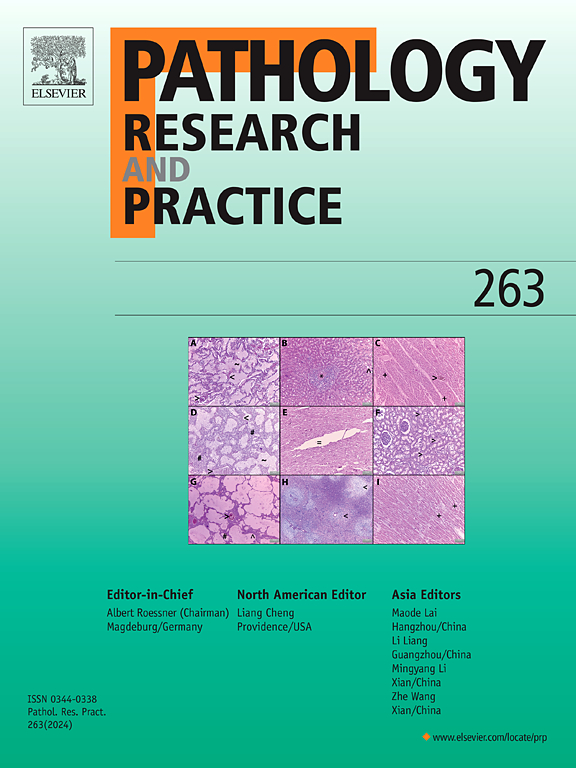B-cell lymphoma: Advances in pathogenesis, diagnosis, and targeted therapies
IF 2.9
4区 医学
Q2 PATHOLOGY
引用次数: 0
Abstract
B-cell lymphomas (BCL) represent a heterogeneous group of blood cancers originating from B-lymphocytes, characterized by diverse clinical manifestations and molecular characteristics. This review highlights recent progress in understanding their pathogenesis, diagnostic approach advancements, and therapeutic strategies developments. Key genetic alterations such as chromosomal translocations (e.g., t(14;18), MYC rearrangements), mutations in tumor suppressor genes like TP53, and disruptions in critical signaling pathways including B-cell receptor (BCR), NF-κB, PI3K/AKT, and JAK/STAT are central to disease development. Additionally, non-coding RNAs, especially microRNAs, play crucial regulatory roles in lymphomagenesis. Innovations in diagnostics, such as liquid biopsy technologies using cell-free DNA (cfDNA) and circulating tumor DNA (ctDNA), have enhanced early detection, disease monitoring, and prognostication. Concurrently, molecular biomarkers and emerging classifiers improve risk assessment and guide treatment decisions. Treatment approaches have evolved beyond traditional chemotherapy and radiotherapy. Targeted therapies such as monoclonal antibodies, kinase inhibitors, bispecific antibodies, and CAR-T cell therapies have shown particular promise in relapsed or refractory cases. Stem cell transplantation remains a valuable option for select patients. Additionally, novel agents targeting epigenetic mechanisms and tumor angiogenesis are under active investigation. This review underscores both the significant advancements and ongoing challenges, such as therapy resistance and adverse effects. The integration of molecular diagnostics with precision-targeted and immune-based therapies is key to advancing personalized care. Future research should aim to characterize tumor heterogeneity better and optimize therapeutic strategies to improve outcomes for patients with B-cell lymphomas.
b细胞淋巴瘤:发病机制、诊断和靶向治疗的进展
b细胞淋巴瘤(BCL)是一种起源于b淋巴细胞的异质性血癌,具有多种临床表现和分子特征。本文综述了最近在了解其发病机制、诊断方法的进展和治疗策略的发展方面的进展。关键的遗传改变,如染色体易位(如t(14;18), MYC重排),肿瘤抑制基因如TP53的突变,以及包括b细胞受体(BCR)、NF-κB、PI3K/AKT和JAK/STAT在内的关键信号通路的中断,是疾病发展的核心。此外,非编码rna,特别是microrna,在淋巴瘤发生中起着至关重要的调节作用。诊断方面的创新,如使用无细胞DNA (cfDNA)和循环肿瘤DNA (ctDNA)的液体活检技术,加强了早期发现、疾病监测和预测。同时,分子生物标志物和新兴分类器改善了风险评估和指导治疗决策。治疗方法已经超越了传统的化疗和放疗。靶向治疗如单克隆抗体、激酶抑制剂、双特异性抗体和CAR-T细胞治疗在复发或难治性病例中显示出特别的希望。干细胞移植仍然是一个有价值的选择,选择的病人。此外,针对表观遗传机制和肿瘤血管生成的新型药物正在积极研究中。这篇综述强调了重大进展和持续的挑战,如治疗耐药性和不良反应。分子诊断与精确靶向和免疫治疗的整合是推进个性化护理的关键。未来的研究应旨在更好地表征肿瘤异质性,优化治疗策略,以改善b细胞淋巴瘤患者的预后。
本文章由计算机程序翻译,如有差异,请以英文原文为准。
求助全文
约1分钟内获得全文
求助全文
来源期刊
CiteScore
5.00
自引率
3.60%
发文量
405
审稿时长
24 days
期刊介绍:
Pathology, Research and Practice provides accessible coverage of the most recent developments across the entire field of pathology: Reviews focus on recent progress in pathology, while Comments look at interesting current problems and at hypotheses for future developments in pathology. Original Papers present novel findings on all aspects of general, anatomic and molecular pathology. Rapid Communications inform readers on preliminary findings that may be relevant for further studies and need to be communicated quickly. Teaching Cases look at new aspects or special diagnostic problems of diseases and at case reports relevant for the pathologist''s practice.

 求助内容:
求助内容: 应助结果提醒方式:
应助结果提醒方式:


